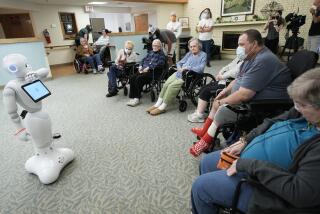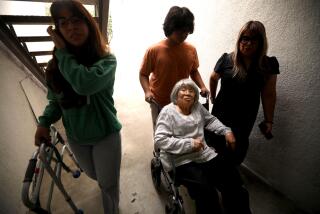Geriatric Care Managers Assist Modern Families in Need
TAMPA, Fla. — Sandy Van De Graaf was trying to rear a teenager, care for her husband, tend her household in a Houston suburb and help an ailing father 1,000 miles away.
It wasn’t working.
She made three two-week trips to Tampa as her father’s back problem worsened, leaving him nearly bedridden. Van De Graaf decided to take him to Houston and turned to Jewish Family Services for help.
That phone call opened a new vista, introducing her to the field of geriatric care managers. These are professionals who help families with the care and needs of older relatives, particularly in long distance situations.
“I would not have survived,” says Van De Graaf, who decided to hire a geriatric care manager and let her father stay at home in Tampa.
In most cases, an adult child requests the services for an aging parent living in another city or state. Requests range from short-term needs such as an evaluation of the elderly person or getting to a doctor’s office to ongoing assistance for long-term care.
Van De Graaf found Erni Goldstein, whose credentials were impressive. She spent the last 15 years working in New Jersey and Tampa in such areas as hospice, guardianship case management, nursing home advocacy and geriatrics.
For the last three years, Goldstein managed the care of Van De Graaf’s father, Sol Fishman of Sun City, who died Aug. 11 at age 87.
“At first, my dad didn’t want her there. Erni turned it around,” Van De Graaf said from her home in Spring, Texas. “My father wound up calling her ‘my buddy.’ She became a surrogate member of our family.”
Goldstein visited weekly, focusing first on immediate needs: medicine, meals and doctor appointments. Fishman got better. She followed his progress with regular telephone calls.
Last Father’s Day, Fishman blacked out, wrecked his car and went into a steady decline. He was in the hospital, then in an assisted living facility, then a nursing home.
Van De Graaf, meanwhile, had her hands full in Texas with her husband recovering from a stroke he suffered during heart bypass surgery. She really had to depend on Goldstein.
“It was like having a sister in Tampa,” Van De Graaf said.
Goldstein had the trust of Fishman’s family, including 16-year-old Lauren, who was close to her grandfather. Goldstein knew Fishman and his medical background. She knew what resources Tampa offered and where to find them. She could cut through red tape and brief doctors.
“I couldn’t have dealt with my dad’s situation without her,” Van De Graaf said.
Goldstein calls the care manager the “eyes and ears for the family.”
The night before Fishman died, Goldstein sat beside his bed holding his hand. “He squeezed my hand,” she said. Goldstein knew it was his way of saying thanks.
“He was my buddy too,” she said, tears welling in her eyes as she spoke.
Florida has 186 elder care managers who are members of the National Assn. of Professional Geriatric Care Managers. The number edges out second-place New York, with 185.
The organization was formed in 1984 and has about 1,500 practitioners nationwide. Fees are on a sliding scale, usually between $75 and $175 an hour, depending on the location. With the exception of Travelers Insurance Company, which offers a long-term care policy, clients pay the costs of care managers, said Connie Rosenberg of Morristown, N.J., president of the national group.
There are no specific requirements to be a geriatric care manager. Most have a background in human services, mental health, nursing or social work.
“It’s a growing field,” Rosenberg said, because the population is aging, adult children are separated from their parents, and more women who typically cared for older family members are in the work force.
“If children are across the country or just across the city and working, they often don’t have the time to sort things out and coordinate all that needs to be done for mom or dad,” Rosenberg said. “They want to ensure their parents are getting the care or services they need.”
The Florida chapter was started eight years ago.
Emily Reese of Cape Coral, president of the Florida chapter, said consumers looking for a professional geriatric care manager should ask for recommendations from previous clients and consider the manager’s education and work background.
Sometimes the health and attitude of a person will improve with stimulation, nutrition and health care, Reese said. This can be stabilizing, preventing further decline. Often that happens when people seek services before a crisis develops.
“Sometimes,” she said, “I am called too late.”
More to Read
Sign up for Essential California
The most important California stories and recommendations in your inbox every morning.
You may occasionally receive promotional content from the Los Angeles Times.










